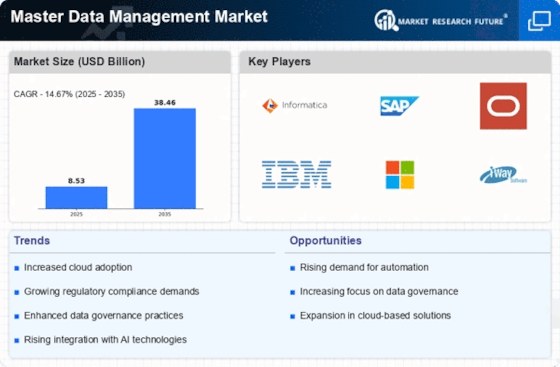Top Industry Leaders in the Master Data Management Market

Navigating the Maze of Master Data: A Dive into the Competitive Landscape of the Master Data Management Market
The Master Data Management (MDM) market, responsible for ensuring consistent and accurate data across an organization, is experiencing a significant surge, projected to reach a colossal growth by 2027. This rapid expansion attracts diverse players, all vying for dominance in this complex ecosystem. Understanding the competitive landscape is crucial for businesses seeking the right MDM solution.
Key Players:
-
SAP SE (Germany)
-
SAS Institute Inc (US)
-
IBM Corporation (US)
-
Tibco Software Inc (US)
-
Informatica Corporation (US)
-
Oracle Corporation (US)
-
Teradata Corporation (US)
-
Orchestra Networks (US)
-
Riversand Technologies Inc. (US)
-
Talend (US)
Strategies for Success:
-
Data Governance and Integration: Players are emphasizing data governance capabilities to ensure data quality, consistency, and compliance with regulations. Integration with existing data sources and enterprise applications is crucial for seamless data management.
-
Cloud-Native Development: Embracing cloud-based architecture enables scalability, agility, and faster deployment, particularly appealing to modern businesses.
-
Artificial Intelligence and Machine Learning: Integrating AI and ML for data cleansing, automated data profiling, and real-time analytics enhances data accuracy and provides actionable insights.
-
Industry-Specific Focus: Tailoring MDM solutions to specific industries like healthcare, finance, or retail allows for deeper specialization and caters to unique data needs.
Factors for Market Share Analysis:
-
Target Market and Company Size: Focusing on specific industry segments or company sizes allows for deeper customization and market penetration.
-
Functionality and Feature Set: The breadth and depth of MDM capabilities offered, encompassing data synchronization, data quality management, and data governance tools, significantly impact competitiveness.
-
Deployment Options and Pricing: Flexible deployment options (on-premise, cloud, hybrid) and attractive pricing models, including subscription options, are crucial for wider adoption.
-
Security and Compliance: Adherence to strict data security standards and regulatory compliance requirements is essential for building trust and securing data integrity.
New and Emerging Companies:
The influx of innovative start-ups keeps the MDM market dynamic, introducing niche solutions and challenging established players. Some examples include:
-
Boomi: Offering cloud-based data integration and MDM solutions with a focus on flexibility and ease of use.
-
UnifiMD: Specializing in MDM for healthcare organizations, addressing the complexities of clinical and patient data management.
-
Syncsort: Providing data intelligence and data quality solutions aimed at optimizing data management processes within MDM ecosystems.
Current Investment Trends:
Investment in the MDM market is robust, with players focusing on key areas like:
-
Cloud-Native MDM Solutions: Developing platform-as-a-service (PaaS) and software-as-a-service (SaaS) offerings for MDM to cater to the growing demand for cloud-based solutions.
-
AI and Machine Learning Integration: Incorporating AI and ML capabilities for advanced data profiling, anomaly detection, and predictive analytics to optimize data management.
-
Data Governance and Compliance Solutions: Developing comprehensive data governance tools and platforms to address rising regulatory requirements and ensure data security.
-
API-Driven Integration: Investing in open APIs and integration platforms to facilitate seamless data exchange between MDM systems and other applications.
Latest Company Updates:
-
Dec 19, 2023: T-Mobile US: Selects Google Cloud as strategic partner for its MDM implementation, highlighting the shift towards cloud-based solutions. -
Jan 3, 2024: Forbes: Increased adoption of SaaS-based MDM platforms due to their scalability, agility, and lower upfront costs compared to on-premise solutions. -
Dec 20, 2023: ZDNet: Rise of artificial intelligence (AI) and machine learning (ML) in MDM for improving data quality, automating tasks, and generating insights.










